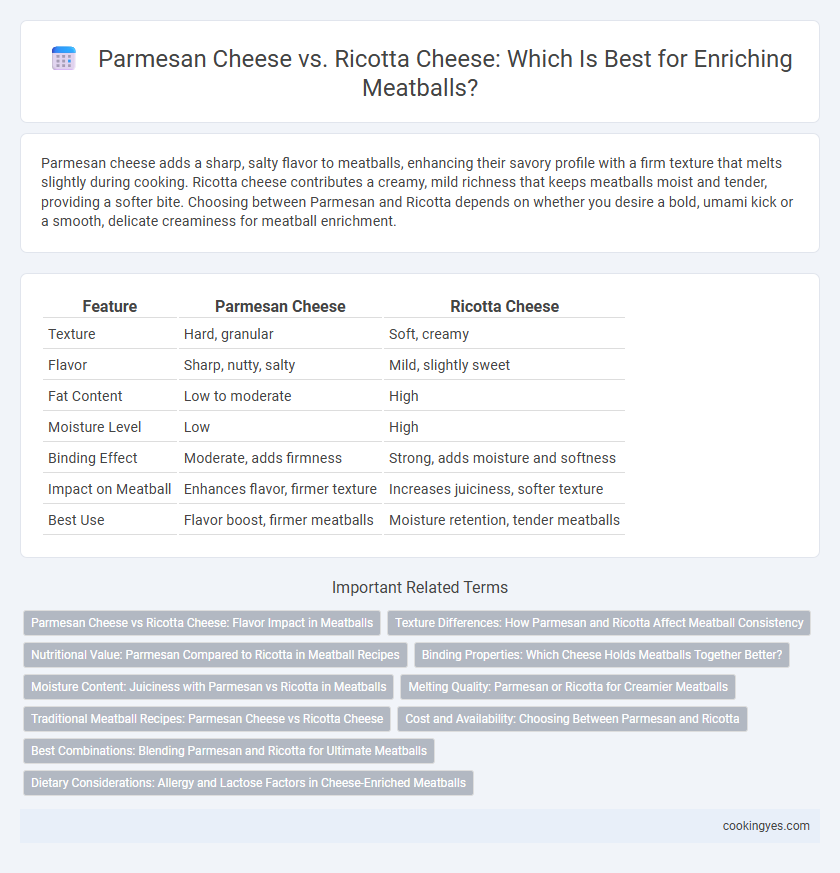Parmesan cheese adds a sharp, salty flavor to meatballs, enhancing their savory profile with a firm texture that melts slightly during cooking. Ricotta cheese contributes a creamy, mild richness that keeps meatballs moist and tender, providing a softer bite. Choosing between Parmesan and Ricotta depends on whether you desire a bold, umami kick or a smooth, delicate creaminess for meatball enrichment.
Table of Comparison
| Feature | Parmesan Cheese | Ricotta Cheese |
|---|---|---|
| Texture | Hard, granular | Soft, creamy |
| Flavor | Sharp, nutty, salty | Mild, slightly sweet |
| Fat Content | Low to moderate | High |
| Moisture Level | Low | High |
| Binding Effect | Moderate, adds firmness | Strong, adds moisture and softness |
| Impact on Meatball | Enhances flavor, firmer texture | Increases juiciness, softer texture |
| Best Use | Flavor boost, firmer meatballs | Moisture retention, tender meatballs |
Parmesan Cheese vs Ricotta Cheese: Flavor Impact in Meatballs
Parmesan cheese imparts a sharp, nutty flavor to meatballs, enhancing their savory depth and adding a subtly salty finish that complements the meat blend. Ricotta cheese contributes a mild, creamy texture that softens the meatballs without significantly altering the flavor profile, promoting moisture retention and tenderness. Choosing Parmesan over Ricotta intensifies the overall taste complexity while Ricotta focuses on creating a delicate, smooth consistency in meatball recipes.
Texture Differences: How Parmesan and Ricotta Affect Meatball Consistency
Parmesan cheese enhances meatball texture by adding a granular, slightly crumbly consistency that helps bind ingredients firmly, resulting in a denser, more cohesive bite. Ricotta cheese contributes moisture and creaminess, producing a softer, more tender meatball with a delicate, almost fluffy interior. The choice between Parmesan and Ricotta directly influences meatball firmness and mouthfeel, balancing dryness and succulence based on desired texture preferences.
Nutritional Value: Parmesan Compared to Ricotta in Meatball Recipes
Parmesan cheese provides a higher protein content and richer calcium levels compared to ricotta, making it a superior choice for enriching meatballs nutritionally. Parmesan's lower moisture content contributes to a firmer texture, enhancing meatball cohesion and flavor concentration. Ricotta offers a creamier texture with higher moisture but contains less protein and calcium, which may slightly dilute the meatball's nutritional density.
Binding Properties: Which Cheese Holds Meatballs Together Better?
Parmesan cheese enhances meatball cohesion through its fine texture and low moisture, which helps to bind ingredients firmly by absorbing excess liquid. Ricotta cheese, with its higher moisture and creamy consistency, creates a softer texture but offers less effective binding, potentially causing meatballs to be more fragile. For optimal structural integrity, Parmesan's binding properties outperform ricotta in maintaining meatball shape during cooking.
Moisture Content: Juiciness with Parmesan vs Ricotta in Meatballs
Parmesan cheese, with its low moisture content, enhances meatball texture by adding a savory, umami depth without increasing juiciness, resulting in a firmer bite. Ricotta cheese contains higher moisture levels, contributing to juicier, softer meatballs that retain tenderness throughout cooking. Choosing Parmesan emphasizes flavor intensity and texture density, while ricotta prioritizes moisture enrichment and succulence in meatball preparation.
Melting Quality: Parmesan or Ricotta for Creamier Meatballs
Parmesan cheese enhances meatballs with a sharp, nutty flavor and melts to a slightly granular texture that adds a rich umami depth but less creaminess. Ricotta cheese offers superior melting qualities, contributing a smooth, creamy texture that creates moist, tender meatballs with a subtle sweetness. For creamier meatballs, ricotta is the optimal choice due to its soft, high-moisture consistency, while Parmesan excels in flavor complexity without significantly altering texture.
Traditional Meatball Recipes: Parmesan Cheese vs Ricotta Cheese
Traditional meatball recipes often call for Parmesan cheese, which adds a sharp, nutty flavor and helps bind the meat mixture while enhancing umami depth. Ricotta cheese, in contrast, contributes a creamy texture and moisture that results in softer, juicier meatballs without overpowering other flavors. Choosing Parmesan enriches meatballs with robust savory notes, whereas ricotta promotes tenderness and a lighter bite, making both cheeses valuable depending on the desired meatball consistency and taste profile.
Cost and Availability: Choosing Between Parmesan and Ricotta
Parmesan cheese offers a rich, nutty flavor and is widely available in both pre-grated and block forms, though it tends to be more expensive than ricotta. Ricotta cheese provides a creamy texture that enhances meatball moisture at a lower cost, and it is commonly found fresh in most grocery stores. When choosing between Parmesan and Ricotta for meatball enrichment, budget-conscious cooks might favor ricotta for affordability and moisture, while those seeking a robust flavor may invest in Parmesan despite its higher price.
Best Combinations: Blending Parmesan and Ricotta for Ultimate Meatballs
Blending Parmesan and ricotta cheese creates a perfect balance of flavor and texture, with Parmesan adding a sharp, nutty taste and ricotta providing creamy moisture to meatballs. This combination enhances the richness and juiciness, preventing dryness while boosting umami complexity. For ultimate meatballs, use a ratio of 2 parts ricotta to 1 part finely grated Parmesan for optimal tenderness and savory depth.
Dietary Considerations: Allergy and Lactose Factors in Cheese-Enriched Meatballs
Parmesan cheese, aged and low in lactose, is often better tolerated by individuals with lactose intolerance, while ricotta cheese, being fresher and higher in lactose, may cause discomfort for sensitive individuals. Allergy considerations highlight that both cheeses derive from cow's milk, posing risks for those with milk protein allergies, though the protein structure differs slightly, affecting allergenic potential. Selecting the appropriate cheese for meatballs hinges on balancing lactose sensitivity and allergy risks to ensure dietary compatibility without compromising flavor and texture.
Parmesan Cheese vs Ricotta Cheese for meatball enrichment Infographic

 cookingyes.com
cookingyes.com